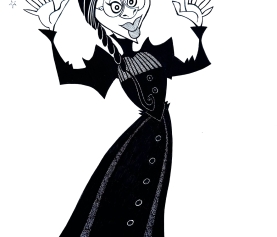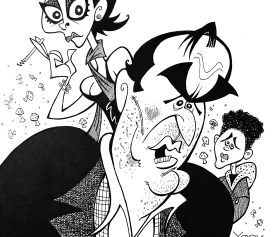Better horror movies tend to have a secondary theme that feeds its main premise. JAWS is about the hunt for a man-eating shark, but it’s also about Chief Brody learning to assert his authority. HALLOWEEN is about a knife-wielding psycho, but it’s also about teenage responsibility. THE SHINING is about a hellish hotel, but it’s also about a haunted writer who can’t shake his past sins. The new frightener THE LODGE also comes with dual themes: its A theme concerns family safety in a snowbound cottage. The B theme is all about horrible parenting.
And that secondary strain announces itself from the opening moment. Laura (Alicia Silverstone) tries to put on a happy face, literally and figuratively, as she prepares to drop her children off with her estranged husband for the weekend. Yet as she applies the lipstick, her mouth droops and the tear ducts gush open. Her angst is so apparent as she frustratingly attempts to reapply her lipstick in the car, it puts her children Aidan (Jaeden Martell) and Mia (Lia McHugh) in a bad mood instantly. All three arrive at dad’s, sulking and tongue-tied.

Jaeden Martell and Lia McHugh
There, Richard (Richard Armitage) informs Laura that he wants to quickly divorce so he can marry his young, new girlfriend Grace. (This Richard is a dick, and Armitage doesn’t even try to make him reasonably sympathetic.) It’s implied that cheating with Grace broke up their marriage, to begin with, and now he’s adding insult to Laura’s injury. She goes home, pours herself a glass of wine, and promptly blows her brains out.
The children never recover, especially Mia who fears that her mother’s suicide dooms her to hell. Her father does a crappy job of comforting her, but he’s completely self-absorbed it’s no surprise. The insensitive schmuck even wants the kids to go along with his scheme to spend Christmas with Grace up at the family cottage, even though mom’s only been in the ground for a few months.
The film cleverly staves off on the reveal of Grace for almost 15 minutes. We expect her to be a bogeyman by the time she shows up, especially since her backstory is that she was the sole survivor of mass suicide by a religious cult a decade ago. (Shades of the Heaven’s Gate cult where 39 members drank poison ritualistically in 1997.) The kids find the video of the catastrophe online showing a spooky, 13-year-old version of Grace standing amongst the carnage.

Riley Keough
Further adding to Richard’s sins is the fact that Grace was the topic of a story he did on the cult, and he blurred the lines when the professional journalist fell for his subject. When we finally meet the adult Grace (Riley Keough), she’s hardly a Manson girl, but rather, a soft-spoken, shy young woman. She bares a striking resemblance to mom Laura, suggesting that Richard pulled a “John Derek” and replaced his wife with a younger version of her.
Keough, quickly becoming one of the industry’s most interesting young actresses, plays Grace as a mysterious mix of conflicted emotions. She’s in love with Richard, prone to romantic giggles during lovemaking, and she truly wants to bond with his kids too. Grace is aware of that uphill battle but tries to be respectful and friendly, even though the kids want nothing to do with her.
Further complicating matters for her are painful memories of the cult, including some of her father’s hectoring lessons as its religious leader. She’s haunted by a portrait of the Virgin Mary in the cottage because it makes her feel guilty about the cult’s blasphemy of God, her adultery with Richard, and her reliance on prescription meds to get through the day. Fuel is added to her fire when Richard decides to return to the city for a few days of work, leaving Grace to tend to the children all by her lonesome.

Richard Armitage
Grace’s pet pooch isn’t much of an emotional support animal while the kids go out of their way to alienate her. They refuse to help hang holiday decorations, reject her lunch offerings, and openly declare they have nothing to say when she tries to engage in conversation. Further challenging her comfort is Aiden’s spying on her while she showers, not to mention a nasty snowstorm that takes out their generator in the night. It all comes to a head when the next morning Grace discovers all of her belonging are missing, including her meds, not to mention all the food in the fridge and pantry.
Is a thief responsible? Are the kids playing a prank? Or is this some form of self-sabotage on Grace’s part now that she’s off her meds? Whomever to blame, the rift between her and the kids becomes paramount, as they’re snowbound hostages. As one day drags into the next, with no cellphone service for emergency assistance, Grace starts to lose her grip on reality. Her vivid memories and imagination mix together to create a phantasm of fear that would make Edgar Allan Poe proud.
Not surprisingly, this tale of terror, written by Sergio Casci, Veronika Franz, and Severin Fiala, and directed by the latter two, is about the descent into madness. All three inhabitants become unreliable narrators, and we in the audience don’t know whom to trust. Can Grace get a grip? Can she parent these children and keep them safe from the elements and starvation? And why the hell isn’t Richard returning to check up on them knowing full-well that they’ve been incommunicado for days?
Franz and Fiala are superb at creating mood in this atmospheric setting, with an insinuating score helping ratchet up the tension with each new revelation. The scares are honest, with nary a cheap jump scare in sight. They don’t develop the three main characters as vividly as they could but keeping the characters at a certain arms-length helps strengthen the mystery of all that occurs.
Ultimately, the B theme eclipses the A theme and cements the filmmakers’ editorializing on the subject of bad parenting. (It was a similar theme in Franz and Fiala’s acclaimed 2014 Austrian thriller GOODNIGHT MOMMY as well.) Grace should never have been forced to parent these kids alone. Those kids shouldn’t have been forced to spend Christmas with dad’s mistress. And dad shouldn’t think of himself first and last every single time. Often times, the best horror films have man as the monster, no supernatural beast needed. The true villain here isn’t a haunted house, freezing weather, cult activity, or any religious piety. It’s man, specifically, a truly atrocious parent, who lets everything go to hell.







